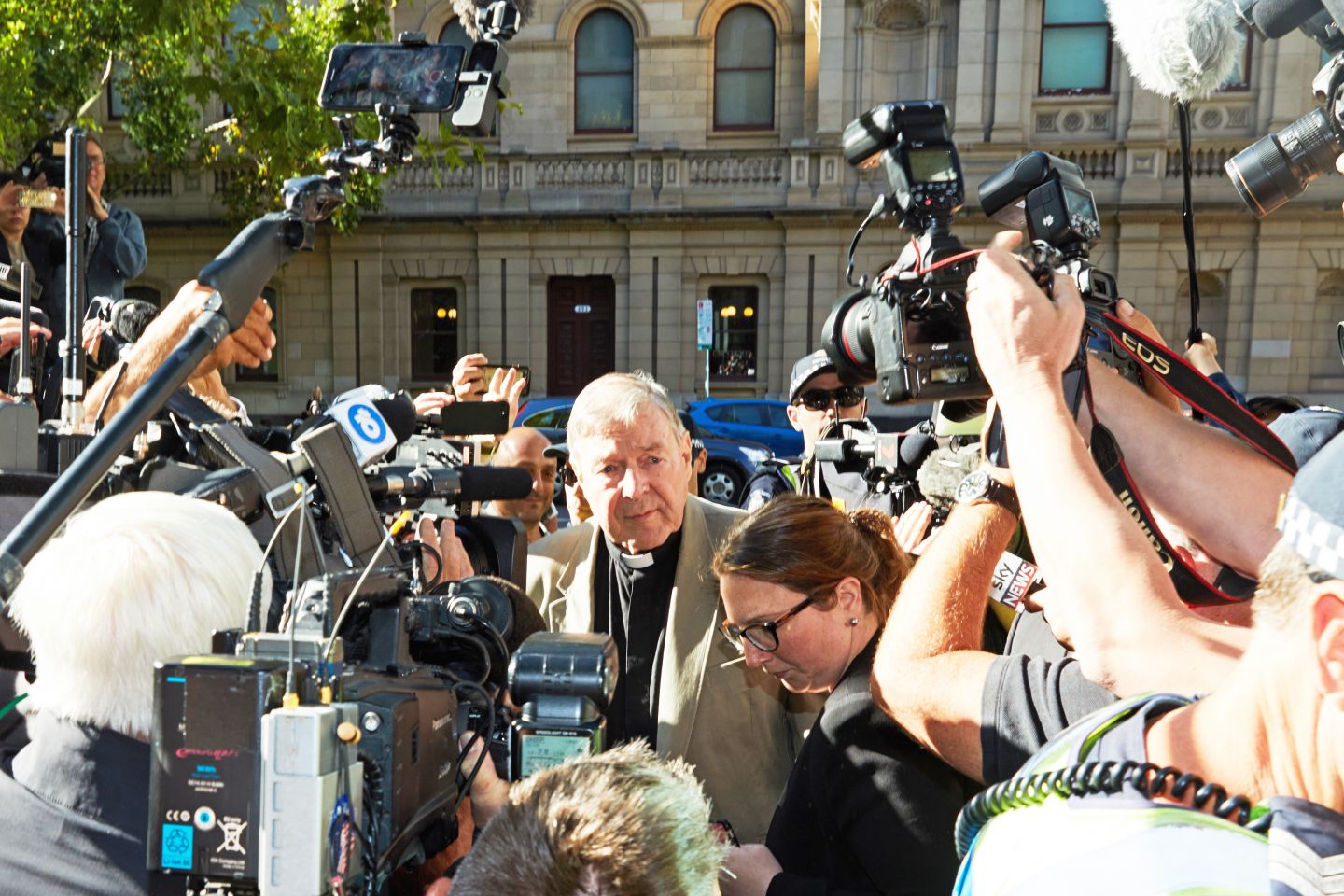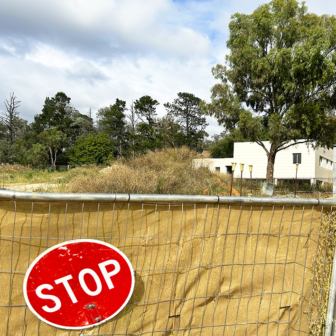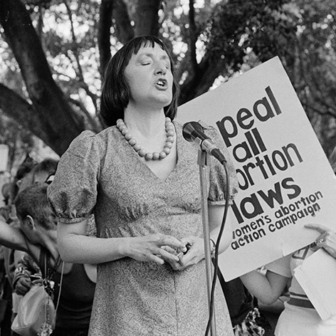“You are supposed to leave the bench when you are angry,” said Peter Kidd, the chief judge of Victoria’s County Court, “but I’ll stay a bit longer to finish this hearing off.” It was two days after a jury found George Pell guilty of five counts of child sexual abuse in the trial Kidd presided over last December. At the time, no one in Australia could report that fact. Instead, the front page of the Herald Sun showed a black page with a single-word headline: “CENSORED.”
“The way I see it at the moment,” Kidd told Pell’s counsel Robert Richter, “is that some of this publicity was designed to put improper pressure upon me.” No kidding. While the Australian media didn’t dare say anything about Pell, they desperately wanted to say something about Kidd: that the chief judge’s suppression order was ill-conceived. And they were right.
In mid 2018, Kidd banned anyone anywhere from publishing “any report of the whole or any part of” any of Pell’s child sexual abuse trials. This publication ban included what Kidd called “electronic communications,” better known as the internet. His order listed some examples of things that no one was allowed to mention: how many complaints or charges Pell was facing; what they were about; the fact that he was to face more than one trial. But the order’s actual terms covered so much more.
The media couldn’t mention any of the evidence the prosecution or defence presented at Pell’s trials, the arguments made by either side’s lawyers, any incidents in the courtroom, any decisions made by Kidd, any appeals from those decisions, any questions from the jury, any actions by court staff. Every single thing that happened in one of the most important trials in Australian history had to be top secret. Most dramatically, the entire country couldn’t be told about — or talk about — what the Daily Telegraph rightly called “THE NATION’S BIGGEST STORY”: the jury’s guilty verdict. Not until this week.
Peter Kidd has been the head of Victoria’s County Court — the Jan Brady of the state’s court system, hearing the matters that are too big for the magistrates but too small for the Supremes, especially sexual-offence cases — since 2015. Before then he had spent twenty-five years prosecuting and… prosecuting: Tony Mokbel, police killers, schoolgirl killers, war criminals. Maybe he could prosecute again? He mused about doing a “summary-type procedure” to bring Australia’s journalists to justice, allowing that he was “a little uncomfortable” acting as the media’s prosecutor, judge and jailer. “Your Honour, my preference would be for you to leave this to me,” was the diplomatic response of Victoria’s director of public prosecutions, Kerri Judd.
That was not the first or last time the chief judge has battled the press. Before Pell’s retrial, he wrote to the Age complaining that a harrowing account of a very different long-delayed sexual-assault prosecution had mentioned decisions by two judges “without any examination of their reasoning.” After journalist Richard Baker defended his report (correctly, in my view) as “factual and not critical of the judges,” Kidd complained that the Age’s subsequent apology “should have been issued following my letter to the editor.” A fortnight ago, Kidd attacked the Herald Sun for complaining (unusually) that a recent sentence had been too harsh. Having pointed out some mild errors in the details, the chief judge then went further, declaring that reporting “that omits highly relevant information, draws inappropriate comparisons and provides false information, has no benefit to the community.”
These views aren’t surprising from a judge who prosecuted during the years when Victorian courts became world leaders in suppression orders. On his appointment as chief judge, he promised he would be “a fierce advocate for judges of this court.” He kept that promise, but also a second one: “I intend to conduct trials.” As chief judge, he can decide who runs any trial, including Pell’s. He chose himself as the right judge to preside over the most high-profile trial in Victorian history.
Judge Kidd’s order was not designed, as some conspiracy theorists would have it, to protect Pell from embarrassment. Nor was it to protect the person who accused him of child sexual abuse at St Patrick’s, though his name remains suppressed and no one apart from Kidd, Pell, the lawyers and the jurors heard his testimony. Rather, his goal was to keep Pell’s first trial secret from twelve or so people: the jury in his planned second trial on totally different child sexual abuse charges.
There’s nothing unusual about an order of this kind. People are generally tried for what they are charged with doing on one occasion, not for what they may have done at other times in their lives. Ordinarily, stopping the local paper or TV station from covering the verdict in one trial until all the trials are done and dusted is an effective and unexceptionable way of keeping the trials separate. But Pell’s case is anything but ordinary.
Usually — as Kidd is wont to complain — the media, and indeed the public, has little interest in what goes on in a criminal trial. The only real story is whether or not the alleged villain is going to jail and for how long. But when famous people or crimes are prosecuted, the opposite is true. When Lindy Chamberlain, O.J. Simpson and Oscar Pistorius were tried, everyone wanted to know every detail of the evidence and events, and the media filled that public demand with blanket coverage. These cases (and their aftermaths) were also occasions for wider and very important discussions about how well the courts do their jobs and about how we should understand and talk about criminal prosecutions, all drawing on the earlier detail.
High-profile cases put the justice system itself on trial, and rightly so. How do the courts treat powerful people? Or people who complain about them? How good — or fair — are our prosecutors? Our defence lawyers? Our chief judges? Pell’s case is one of the highest-profile opportunities to debate one of the law’s toughest questions: do courts respond fairly to claims of sexual abuse? And aren’t people interested not only in whether Pell is going to jail but also in whether Australia’s highest-ranking Catholic is also its highest-ranking paedophile? Was the complaint against him believable? Was the defence compelling? Was there doubt? Or not?
This week, we are finally reading attempts to debate these issues across the media. But everything we read is written in hindsight and without the benefit of earlier public discussion. Even the longest articles compress the many weeks of Pell’s trial and retrial into just a handful of pages or paragraphs. As readers, we are wholly dependent on whatever caught the attention of the dozen or so journalists (and their editors) who sat through both trials in silence. And all the details — from Pell’s shirty responses to the police’s questions to the minutiae of his priestly robes to the arguments of famed defence lawyer Robert Richter — will be swept away in a day or two by the next story to dominate the press. Open justice delayed isn’t open justice denied, but it is open justice diminished.
Moreover, Peter Kidd’s goal in making his order, while worthy, was impossible to achieve. There is far too much interest in Pell’s case for its secrets to remain remotely secret. Yes, Australian media could be expected to obey Kidd’s order (until they didn’t), but international media are another matter altogether. As for social media, plenty of people were willing to breach Kidd’s order, out of ignorance or otherwise. I found out about Pell’s conviction hours after it happened the way many did: because his name trended on Twitter.
All the chief judge could really achieve was to keep Pell’s verdict out of the mainstream local media. In the past, that might have been enough. But today the many breaches of Kidd’s order meant that the real story was always just a web search or an overheard conversation away. Yes, the order would have assisted in finding twelve jurors willing to say that they knew nothing about the first trial or verdict. Many of them might even have been telling the truth. And some of them might somehow have refrained from googling Pell or mentioning the trial to a spouse or neighbour until the verdict was in. But what are the odds that any of them, let alone all of them, would remain spoiler-free by the trial’s end? And yet, that goal was the sole point of Kidd’s order.
We now know that, even in an imaginary world where a County Court judge could truly silence the internet, the order would still have been totally pointless. This week, all remaining charges against Pell were dropped. (If it hadn’t been for Kidd’s order, that would have been the nation’s biggest story this week.) Kidd himself ruled last week that the prosecution could not try to prove charges that Pell molested kids at a Ballarat swimming pool by relying on a separate, uncharged alleged incident at a lake. Apparently, that ruling was enough for prosecutor Fran Dalziel to drop the case altogether.
Kidd’s ruling on the evidence could have been made weeks ago. Indeed, DPP Kerri Judd asked the chief judge to do so at the very hearing where he slammed the media. His response? “No, it’s just impossible. I’m not here for a period in January and nothing will change that,” noting that Pell’s retrial (after his first jury hung) had thrown out his schedule. No doubt the judge deserved a break, but his delay (and his seeming refusal to let another judge hear the next trial) meant that his suppression order continued for weeks longer than necessary. In theory, he could have made his ruling on the evidence before Pell’s first trial began, which would have allowed it to be fully reported.
The chief judge did have room in his schedule to explain what crimes he thought Australia’s journalists might have committed. The first was that he thinks the journalists’ vague coverage may have breached his suppression order. The media, he said, “seem to be operating on a misinformed basis that it’s okay to print everything and anything apart from” Pell’s name. Kidd’s view is that you can breach his order simply by stating, as the Age (among others) did, that “a very high-profile figure was convicted on Tuesday of a serious crime.” In addition, Kidd’s view is that there is a “serious question” that journalists were committing contempt of court, “namely bringing inappropriate and improper pressure upon me to vary or revoke my suppression order application.”
These claims are adventurous ones that (once again) push at the boundaries of Victorian contempt and suppression law. Kidd was also willing to opine that “a number of very important people in the media are facing, if found guilty, the prospect of imprisonment and indeed substantial imprisonment,” words he ordered should be distributed to the media immediately. When the local media read the transcript, which included Judd musing on the possibilities of extraditing journalists, bizarrely mirroring earlier discussions about Pell himself, they all pulled their stories. Meanwhile, baffled overseas papers one by one opted to report the truth.
Now that the suppression order is gone, the media is free to report that dozens of them have received “show cause” letters from Judd, the first step in the deliberately unsettling process often used to prosecute journalists. The journalists’ lawyer claims that the letters were even sent to people who were not at work when the stories ran. I don’t blame the DPP for going over the top. Judge Kidd’s comments put her in an invidious position.
If the past is any guide, the media will apologise and the prosecutions will end without jail sentences. But I have a slim hope of a different result. Last Monday, lawyers learnt of the death of one of Victoria’s leading criminal law judges (and scourges of many a criminal), Phil Cummins. This led me to re-read one of his most celebrated judgements from two decades ago. In a literary classic of the courtroom that it is very much worth reading, Cummins narrates how a solicitor engaged a bulldozer to destroy the boundary line between his property and another that was auctioned that day. When the vendors and police arrived at the solicitor’s home with an injunction from Supreme Court Justice Barry Beach, the solicitor declared, “Justice Beach has got his hand on his dick.” Informed by the vendor’s solicitor, the Supreme Court’s chief clerk initiated a hearing on contempt of court.
Fatefully, the judge who was assigned to hear the charge was Phil Cummins. While Cummins made his contempt of the solicitor very clear, his judgement in the case was a model of wisdom. He observed that the solicitor “interrupted but did not prevent oral service upon him of the Court process. He then complied with it.” Cummins famously opined, “It may be offensive, but it is not contempt of court, for a person to describe a judge as a wanker.”
Cummins is right. Everyone has to obey the law but absolutely no one has to like it. And no one should ever be punished for saying exactly that, using whatever words he or she considers best. •




